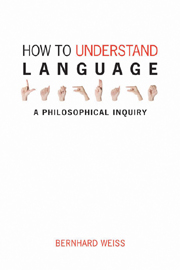Book contents
- Frontmatter
- Contents
- Preface
- 1 The puzzles of language
- 2 The starting-point for analysis
- 3 Analysing sentence-meaning
- 4 Analysing synonymy
- 5 Radical translation
- 6 The structure of a theory of meaning
- 7 Radical interpretation
- 8 Linguistic norms, communication and radical interpretation
- 9 Linguistic normativity
- 10 Radical or robust?
- 11 Language and community
- 12 Rules and privacy: the problem
- 13 Rules and privacy: the solution?
- 14 Truth-conditions versus use-conditions
- Notes
- Bibliography
- Index
4 - Analysing synonymy
- Frontmatter
- Contents
- Preface
- 1 The puzzles of language
- 2 The starting-point for analysis
- 3 Analysing sentence-meaning
- 4 Analysing synonymy
- 5 Radical translation
- 6 The structure of a theory of meaning
- 7 Radical interpretation
- 8 Linguistic norms, communication and radical interpretation
- 9 Linguistic normativity
- 10 Radical or robust?
- 11 Language and community
- 12 Rules and privacy: the problem
- 13 Rules and privacy: the solution?
- 14 Truth-conditions versus use-conditions
- Notes
- Bibliography
- Index
Summary
Our attempt to elucidate the notion of meaning via analysis seems to depend solely on how one rates Grice's attempt to analyse sentence-meaning. It is worth noting that even if that account does not face internal difficulties, it still does not resolve the question of meaning itself but reduces linguistic meaning to mental meaning plus convention. But there is another potential starting-point for analysis. Rather than analysing an assignment of meaning to an expression, one might instead try to analyse sameness of meaning or synonymy. Our aim in analysis will accordingly be to arrive at true sentences of the form:
e1 means the same as e2 iff?
or,
the meaning of e1 is the same as the meaning of e2 iff?
where we are attempting to fill in the question mark.
The appeal of this is manifold. First, sentences of the form “e1 means the same as e2” are ordinary sentences of English. Secondly, they remain grammatical no matter what expressions take the place of “e1” and “e2”. Third we resist any presuppositions about meanings being entities or about what sort of entities they are.
However, it might seem that we are only analysing sameness of meaning rather than meaning itself. So it might seem that we are falling short of our goal. When Frege (1953: §§62–9) was interested in analysing the concept of number, he began by analysing sentences of the form “the number of Fs is the same as the number of Gs”.
- Type
- Chapter
- Information
- How to Understand LanguageA Philosophical Inquiry, pp. 57 - 64Publisher: Acumen PublishingPrint publication year: 2009



